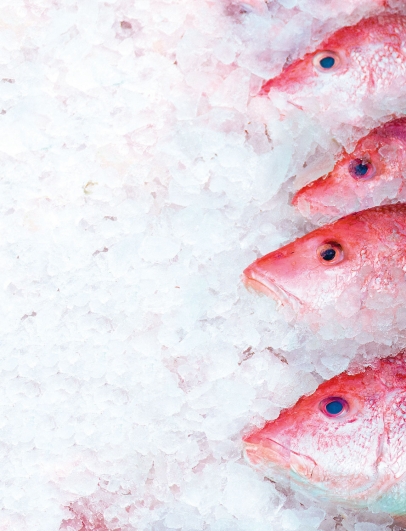Share the Gulf
Think about the last time you had fresh Gulf seafood at a local restaurant or purchased from the market. How amazing was it?
The coalition Share the Gulf wants to ensure that everyone continues to have access to that seafood, to both support businesses that buy and sell Gulf-produced seafood and to make sure the seafood supply is sustainable.
Share the Gulf got started in 2013–14 during a policy battle over the reallocation of the popular red snapper fish, says Bradenton resident Elizabeth Silleck, a senior conservation manager with the Environmental Defense Fund, which is active with Share the Gulf. Reallocation can reduce the quota of fish that federally managed commercial fisheries are allowed to catch and sell and may instead provide a higher quota to recreational anglers, Silleck explains.
Around that time of the red snapper reallocation, Share the Gulf began as a group of restaurant owners, chefs, seafood suppliers, and other related businesses to advocate for sustainable, fair fisheries access.
The restrictions placed on commercial fisheries are often juxtaposed with recreational fisheries management. However, this doesn’t mean the two sides can never agree. In fact, many supporters of Share the Gulf are recreational anglers as well as chefs or commercial seafood consumers, Silleck says. “Members of the coalition want fair access for all, including the seafood consumer.”
Supporters of Share the Gulf also advocate for greater accountability regarding the number of fish caught by recreational anglers, as the numbers collected now are usually estimates and extrapolations versus strict counting. One such eff ort for better accountability is Amendment 50, under development by the Gulf of Mexico Fishery Management Council, which could enable better counting of red snapper caught by recreational fishermen.
“People often say they love recreational fishing, but agree that it shouldn’t come at the expense of an important industry on the Gulf Coast,” Silleck says. Amendment 50 could help to improve access for recreational anglers without hurting the seafood supply chain and seafood customers whose access to Gulf fisheries comes through a restaurant or grocery store.
Supporters of Share the Gulf can circulate action alerts, write op-eds for their local newspapers or contact decision-makers when there is pending policy and laws that can affect fisheries in the Gulf of Mexico, Silleck says. The coalition runs on volunteer efforts.
Share the Gulf raises awareness about its cause through participation in local events, such as the Feast on the Beach in Clearwater in late 2018. Share the Gulf also helped to support the Chefs Collaborative Fifth Annual Sustainable Seafood Dinner last August in Sarasota. Supporters of Share the Gulf span Gulf states like Alabama, Florida, Louisiana, Mississippi, and Texas, although supporters listed on their website are located all around the U.S. Prominent local members are Steve Phelps, owner of Indigenous Restaurant, and Edible Sarasota, the coalition’s first media member.
Those interested in supporting Share the Gulf can visit their website (sharethegulf.org), their Facebook page, or on Twitter @ShareTheGulf to read more news or sign up to receive alerts about pending policy and legislation.





